Physical Address
304 North Cardinal St.
Dorchester Center, MA 02124
Physical Address
304 North Cardinal St.
Dorchester Center, MA 02124
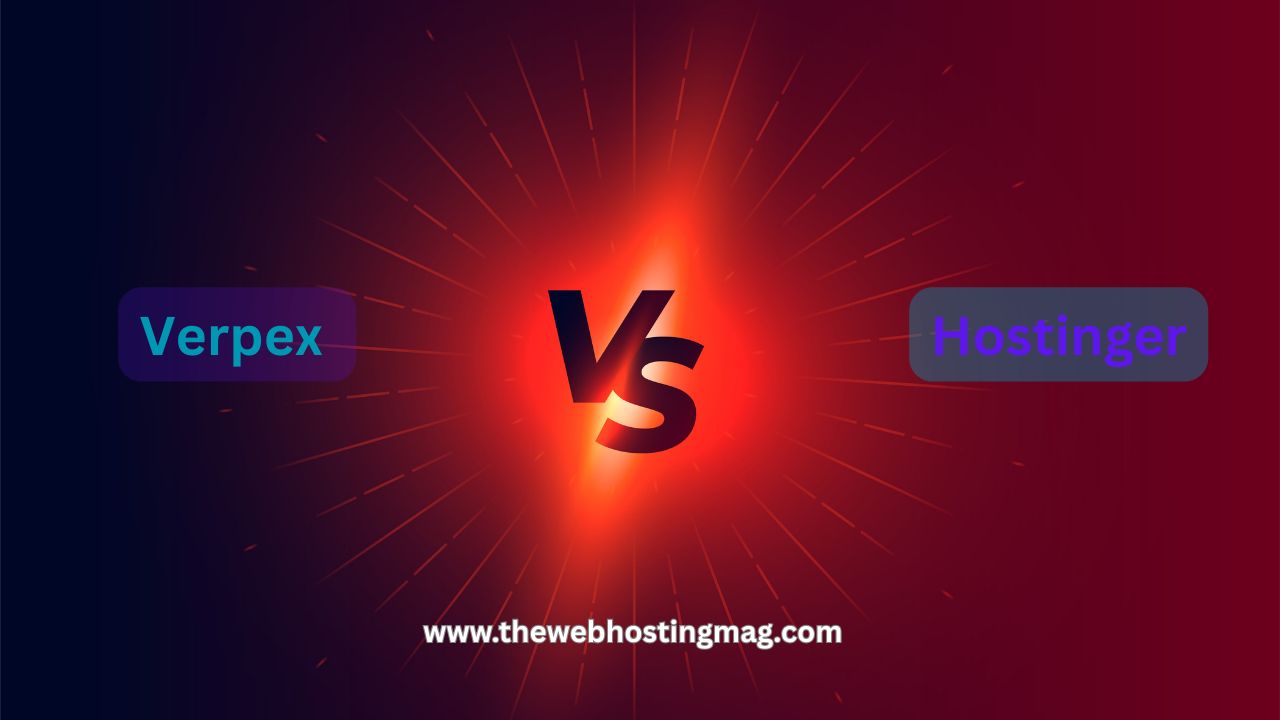
When it comes to choosing the best hosting provider, the decision can be overwhelming. Verpex vs Hostinger is a popular debate among website owners, especially those looking for budget-friendly options with solid performance. Both providers offer a range of hosting plans, but the question remains which one is right for you?
In this post, we’ll break down the key differences between Verpex and Hostinger, covering everything from performance and speed to pricing, support, and security features. By the end of this guide, you’ll have all the information you need to make an informed choice and pick the best host for your needs.

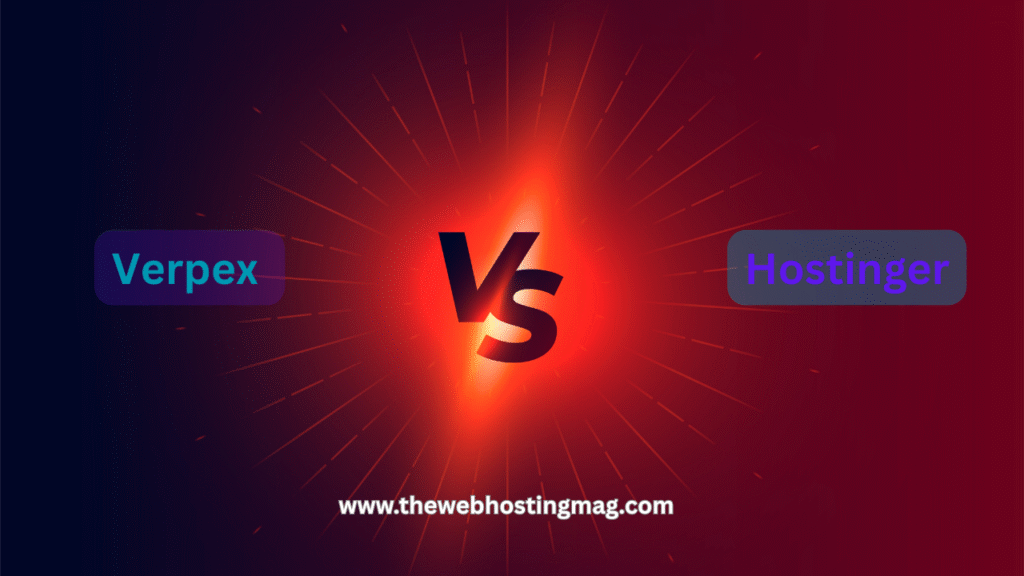
Before diving into the full comparison, here’s a quick snapshot of how Verpex and Hostinger stack up in the most important categories for website owners in 2025:
| Feature | Verpex | Hostinger |
|---|---|---|
| Starting Price | $0.60/month (with promo) | $2.99/month (with promo) |
| Renewal Price | From $5/month | From $3.99/month |
| Uptime Guarantee | 99.99% | 99.9% |
| Average Load Time | ~450 ms | ~350 ms |
| Data Center Locations | 12 global locations | 8+ locations (including US, UK, Asia) |
| Control Panel | Standard cPanel | Custom hPanel |
| Free Domain | Yes (with most plans) | Yes (with 12+ month plans) |
| Free Migrations | Unlimited site migrations | One free migration |
| Customer Support | 24/7 Live Chat + Email | 24/7 Live Chat + AI Bot |
| Money-back Guarantee | 45 days | 30 days |
This table isn’t just a surface-level feature list it highlights the real differences that matter when choosing a host:
This snapshot helps narrow down the right fit depending on your needs whether you’re starting your first blog or migrating multiple client websites.

Understanding where a hosting company comes from helps you gauge not just its reliability, but its long-term vision. Here’s a look at the roots and reputation of Verpex and Hostinger two companies with very different histories and trajectories.

Founded in 2019, Verpex is a relatively new player in the web hosting space, but it’s quickly gained attention for its customer-first approach and high-touch support. Unlike many older hosting providers that have become large and impersonal, Verpex markets itself as an agile, independent company focused on service quality over sheer scale.
Verpex’s biggest selling point is its global infrastructure boasting 12+ data center locations across the world, which is impressive for a company this young. They’ve also leaned into features like unlimited free site migrations, daily backups, and premium support, which positions them as a strong contender for freelancers, agencies, and small businesses that want personal support without enterprise pricing.
Key Takeaway: Verpex may be newer, but its rapid growth and global footprint show a strong commitment to performance, scalability, and user satisfaction.
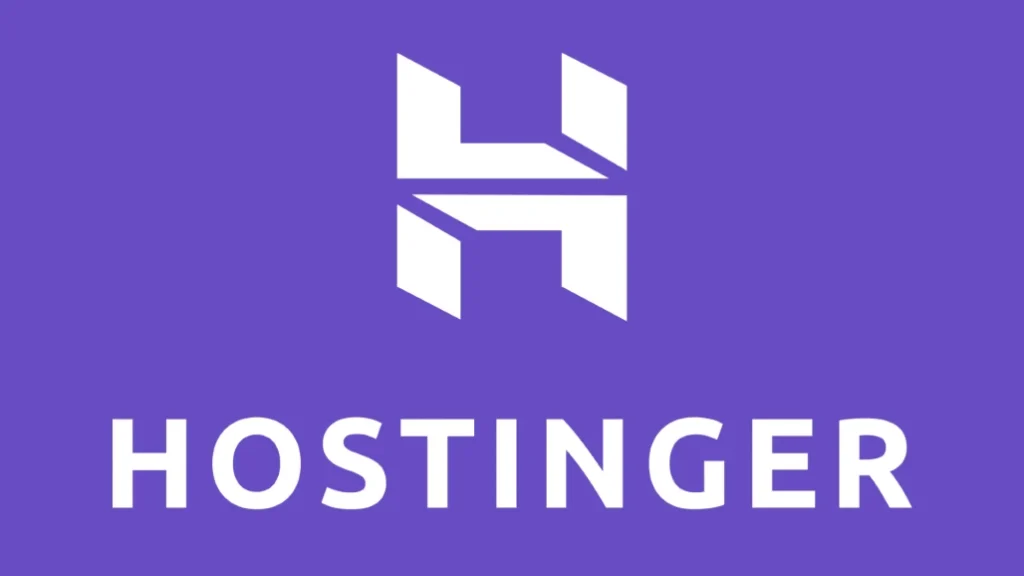
Hostinger, on the other hand, has been around since 2004 and has grown into one of the most well-known budget hosting brands in the world. What started as a small tech startup in Lithuania has evolved into a global hosting powerhouse, serving millions of users across 150+ countries.
Its primary appeal lies in affordable pricing and a custom-built dashboard (hPanel) that simplifies hosting for beginners. Hostinger’s infrastructure is backed by LiteSpeed servers, a built-in caching engine, and strategically placed data centers in North America, Europe, and Asia.
Despite its massive scale, Hostinger continues to invest heavily in UX improvements, AI-powered tools, and performance optimization all while keeping its plans competitively priced.
Key Takeaway: Hostinger’s long-standing reputation, scalability, and continuous platform enhancements make it a solid choice for entry-level users and cost-conscious website owners.
By looking at their company DNA, the difference is clear:
Verpex is built for users who value personalized service and flexibility, while Hostinger is ideal for those looking for reliable, low-cost hosting from a seasoned provider with a global reach.
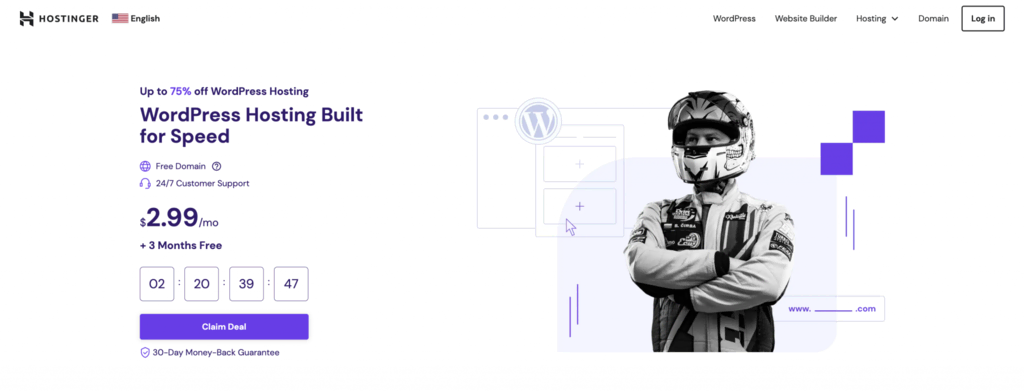

When it comes to web hosting, speed isn’t just a luxury it’s a ranking factor, a user experience signal, and a conversion driver. A slow website frustrates users and hurts SEO. So how do Verpex and Hostinger perform when it comes to raw speed and reliable infrastructure?
Both Verpex and Hostinger deliver solid performance, but they go about it differently:
Here’s a quick snapshot based on user feedback and tests:
| Metric | Verpex | Hostinger |
|---|---|---|
| Average TTFB (Time to First Byte) | ~400 ms | ~300 ms |
| Page Load Time (basic WP site) | ~1.2s | ~1.0s |
| Peak Traffic Handling | Stable (cloud-based) | Very stable (LiteSpeed) |
Bottom line:
If you’re chasing milliseconds and want built-in speed tools, Hostinger is slightly ahead. If you’re optimizing for global audiences and want control over performance tuning, Verpex is still a very capable option.


A fast website is important but a fast website that goes offline frequently is worse than a slow one. Uptime and reliability are critical factors when choosing a hosting provider, especially if your site supports customers, revenue, or your professional reputation.
Let’s look at how Verpex and Hostinger compare in keeping your website up and running.
While guarantees don’t always reflect real-world performance, they give you a sense of what the company is aiming for and willing to back financially (often through credits or refunds).
In independent monitoring and user feedback, here’s what actual performance looks like over the past 6–12 months:
| Metric | Verpex | Hostinger |
|---|---|---|
| Real-World Uptime | ~99.98% | ~99.95% |
| Downtime per Month | < 8 minutes | ~20–25 minutes |
| Major Outages | Rare | Rare, but more noticeable |
| Maintenance Notices | Transparent + Scheduled | Transparent + Scheduled |
Both providers are highly reliable, but Verpex has a slight edge in minimizing downtime and recovering quickly when issues arise.
Both providers do a solid job of keeping your site online, but:
Verdict: If uptime is mission-critical (e.g., ecommerce or business websites), Verpex may give you a little more peace of mind. For most other users, Hostinger is more than dependable enough.

A hosting provider can have all the performance and uptime in the world but if the user interface is confusing or outdated, the experience quickly becomes frustrating. Whether you’re a beginner launching your first website or a developer managing multiple projects, the control panel plays a big role in your day-to-day workflow.
Let’s compare Verpex and Hostinger in terms of user-friendliness, onboarding, and overall usability.
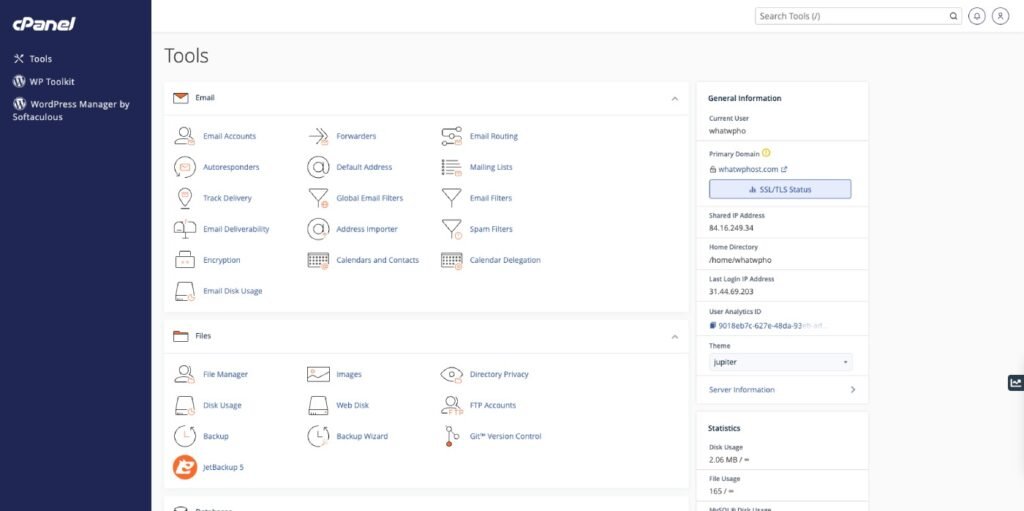
Verpex sticks with the industry-standard cPanel, which is great news for users who prefer a traditional, robust interface. cPanel is familiar to millions of developers and freelancers around the world and offers powerful control over your hosting environment.
Pros of Verpex’s Setup:
Possible Drawbacks:
Good to Know: Verpex also provides helpful onboarding emails and quick support if you need assistance navigating cPanel for the first time.
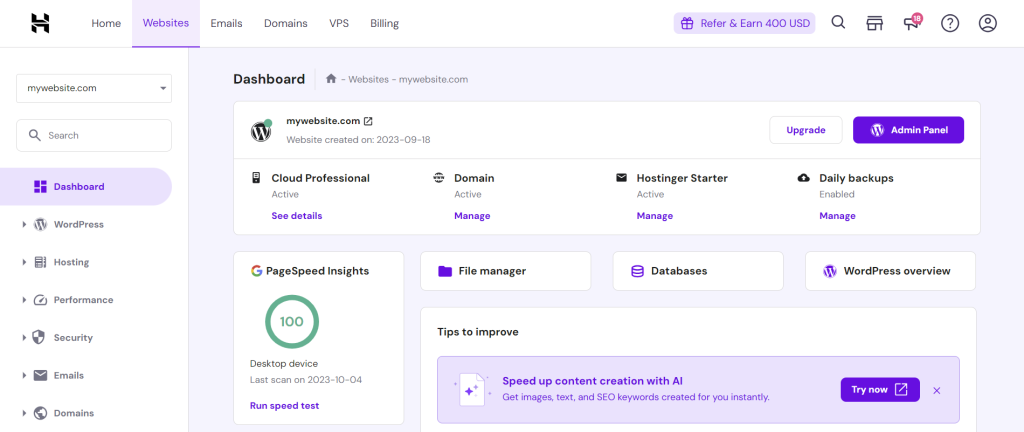
Hostinger uses its own custom control panel called hPanel a streamlined, modern interface built for ease of use. It’s less cluttered than cPanel and was designed specifically for non-technical users.
Pros of Hostinger’s hPanel:
Possible Drawbacks:
Good to Know: hPanel gets frequent updates and now includes a growing number of tools tailored to WordPress users.
| Feature | Verpex (cPanel) | Hostinger (hPanel) |
|---|---|---|
| Ease of Use (Beginners) | Moderate | Very Easy |
| Feature Depth (Advanced Users) | High | Medium |
| UI Design | Functional, Traditional | Clean, Modern |
| App Installer | Softaculous | Auto-Installer |
| Built-in WordPress Tools | Basic | Advanced |
Verdict:
Choose Hostinger for ease and simplicity.
Choose Verpex if you’re comfortable with traditional tools and want full backend control.

While performance and support are critical, pricing often determines where users start especially for small businesses, bloggers, and freelancers. But not all “cheap” hosting is created equal. Let’s break down how Verpex and Hostinger structure their pricing and what you actually get for your money.

Verpex offers some of the lowest entry-level pricing in the market as little as $0.60/month when promotions are active. But what really sets them apart is their value-per-dollar, especially for agencies or users managing multiple sites.
Highlights of Verpex Pricing:
Verpex Shared Hosting Tiers:
| Plan | Starting Price | Websites Allowed | Free Migrations | Renewal Price |
|---|---|---|---|---|
| Mini | $0.50/month | 1 | Unlimited | ~$5/month |
| Starter | $1.50/month | 5 | Unlimited | ~$7/month |
| Pro | $2.50/month | 10 | Unlimited | ~$9/month |
Great For: Agencies, developers, or anyone managing multiple websites who wants flexibility and consistent pricing.
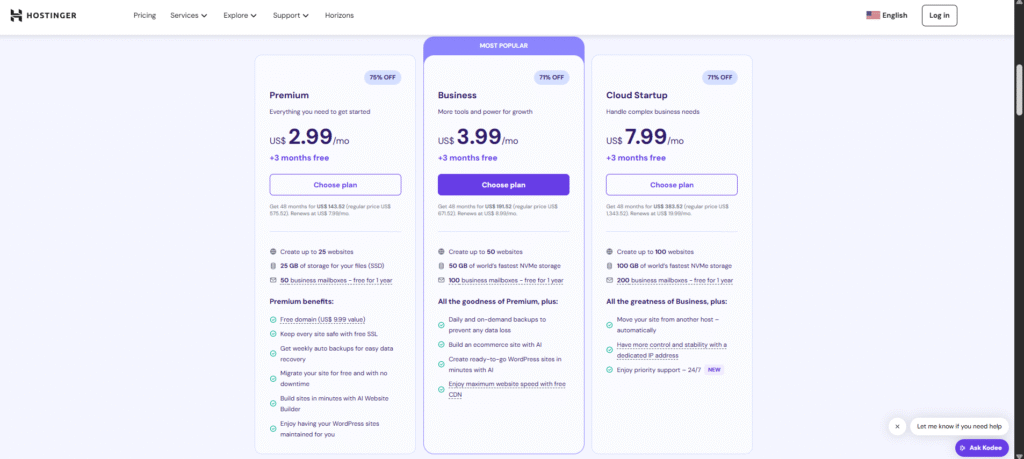
Hostinger is known for aggressively low prices, but it also adds value through thoughtful bundling. Its lowest-tier shared hosting often starts around $2.99/month for a single website, but the real savings come with longer commitments.
Highlights of Hostinger Pricing:
Hostinger Shared Hosting Tiers:
| Plan | Starting Price | Websites Allowed | Free Domain | Renewal Price |
|---|---|---|---|---|
| Premium Web | $2.99/Month | 25 | Yes | $7.99/Month |
| Business Web | $3.99/month | 50 | Yes | $8.99/month |
| Cloud Startup | $7.99/month | 100 | Yes | $19.99/month |
Great For: Beginners, personal websites, or users on a tight budget who want fast, secure hosting with low upfront costs.
| Feature | Verpex | Hostinger |
|---|---|---|
| Entry Price | Lower (starts at $0.60) | Slightly higher ($2.99) |
| Renewal Costs | Transparent, slightly higher | Lower renewals with longer terms |
| Free Migrations | Unlimited | 1 included |
| Free Backups | Daily included | Weekly (daily only on higher plans) |
| Multisite Hosting | From mid-tier plans | Only on Premium or above |
| Value for Agencies | Very high | Medium (unless on Business plan) |
Verdict:
Choose Verpex if you want scalable hosting with full control at a low price.
Choose Hostinger if you want a budget-friendly, beginner-focused host with great speed and solid features out of the box.

When your site is down or something breaks, customer support becomes the most important feature of any hosting provider. Fast, helpful, and knowledgeable support can be the difference between a quick fix and hours of frustration.
Let’s compare Verpex and Hostinger based on support availability, responsiveness, and the actual user experience.
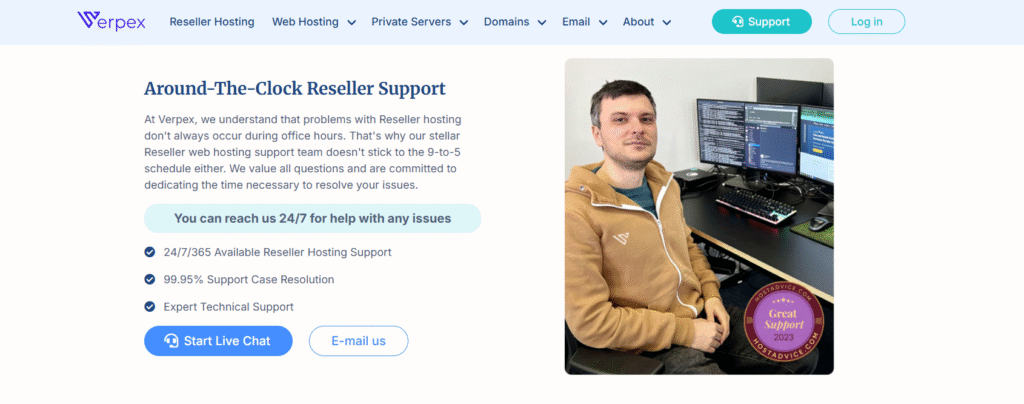
One of Verpex’s biggest selling points is its premium customer support, which is available 24/7 via live chat, email, and ticketing. While many hosts automate their support heavily, Verpex leans into a more personal approach.
Support Highlights:
Unique Advantage:
Verpex doesn’t just answer your questions they often go above and beyond to resolve issues for you, making it ideal for users who aren’t tech-savvy or who manage multiple client sites.
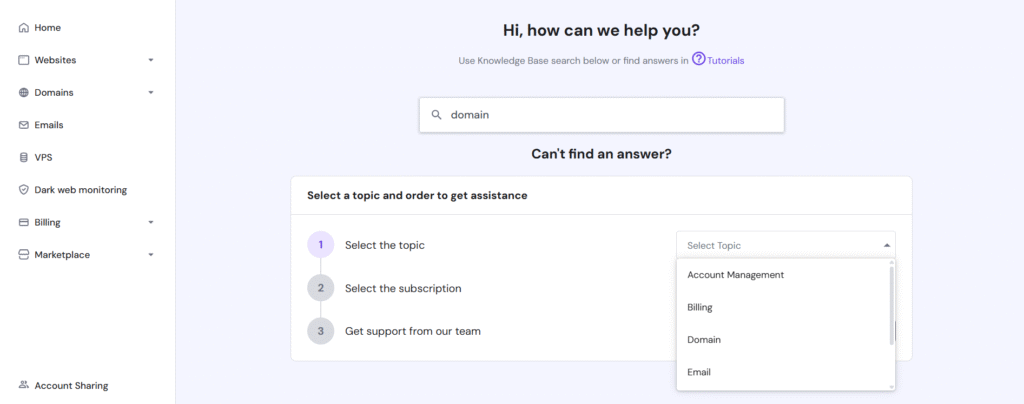
Hostinger has made major improvements in its support over the past few years. Its support is also available 24/7, primarily via live chat. They’ve added AI-powered suggestions and a huge knowledge base to help users self-serve when possible.
Support Highlights:
What to Expect:
Hostinger support is helpful for general inquiries and most hosting tasks. However, for more technical or custom issues (e.g., advanced WordPress errors, plugin conflicts), users occasionally report needing multiple follow-ups or escalations.
| Feature | Verpex | Hostinger |
|---|---|---|
| Live Chat Availability | 24/7 | 24/7 |
| Response Time | 2–5 minutes | 5–10 minutes |
| Ticketing System | Yes | Yes |
| Knowledge Base | Growing but smaller | Extensive and detailed |
| AI Chat Assistant | No | Yes |
| Free Site Migration Support | Included, fully managed | 1 migration included |
| Personalized Help | High | Medium |
Verdict:
Choose Verpex if you want premium support with a personal touch.
Choose Hostinger if you prefer a fast, self-service experience backed by responsive chat agents.

Security isn’t optional it’s essential. Whether you’re running a personal blog or an ecommerce store, the risk of data breaches, malware, and downtime is real. A reliable hosting provider should offer not just basic protection, but proactive, layered security that gives you peace of mind.
Here’s how Verpex and Hostinger compare in terms of their built-in and advanced security offerings.
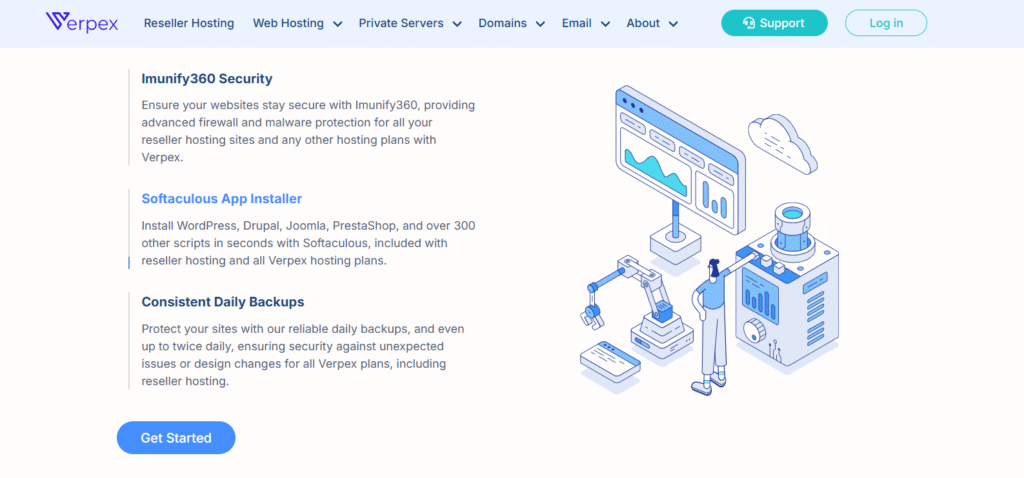
Verpex puts a strong focus on security out of the box. Even its lowest-tier plans include key protections designed to guard your site from common threats. It’s especially appealing for users who want hands-off security protection that just works.
Core Security Features:
Standout Benefit:
Verpex includes daily backups and unlimited free migrations, so even if something does go wrong, you’re never far from a clean restore point.
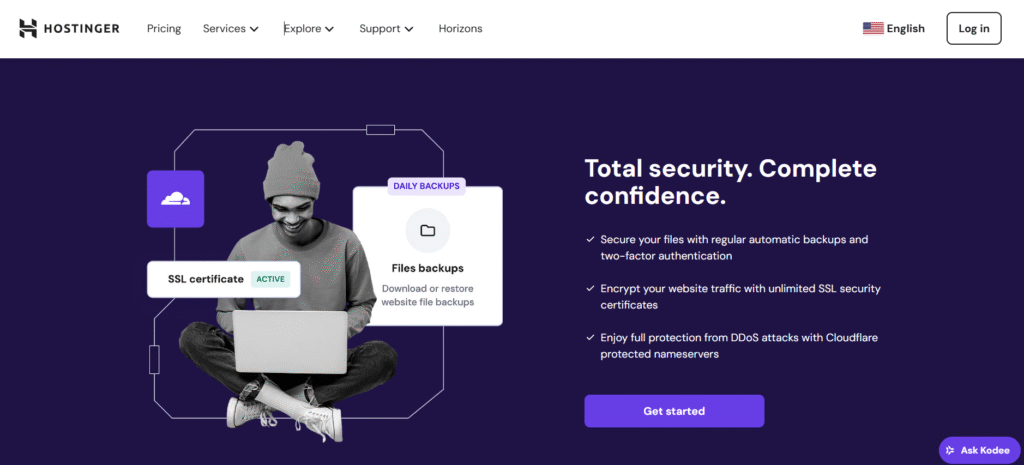
Hostinger combines budget-friendly hosting with a surprisingly strong set of security tools especially impressive considering its pricing. Many of these features are powered by LiteSpeed technology and a custom security stack.
Core Security Features:
Standout Benefit:
Hostinger also includes WordPress-specific security enhancements, like auto-updates, brute-force protection, and one-click hardening features in its dashboard.
| Security Feature | Verpex | Hostinger |
|---|---|---|
| SSL Certificate | Free on all plans | Free on all plans |
| Backups | Daily on all plans | Weekly (daily on premium plans) |
| DDoS Protection | Included | Via Cloudflare integration |
| Malware Protection | Server-level scanning | BitNinja + custom tools |
| Account Isolation | Yes | Yes |
| WordPress Hardening Tools | Manual or plugin-based | Built into dashboard |
| Two-Factor Authentication | No (as of now) | Yes |
Verdict:
Choose Verpex if you want dependable, low-maintenance security across multiple sites.
Choose Hostinger if you’re a hands-on user or WordPress site owner who wants integrated tools and account-level features like 2FA.

Choosing the right hosting provider is more than just comparing prices it’s about finding a reliable partner for your online growth. Both Verpex and Hostinger bring solid value to the table, but the best choice depends on how you build, manage, and scale your site.
Before you decide, take a few minutes to assess your priorities: ease of use, budget, technical control, and future growth.
🔗 Try Verpex Hosting – Great for agencies, developers, and anyone managing multiple websites.
🔗 Get Started with Hostinger – Perfect for beginners and WordPress users on a budget.